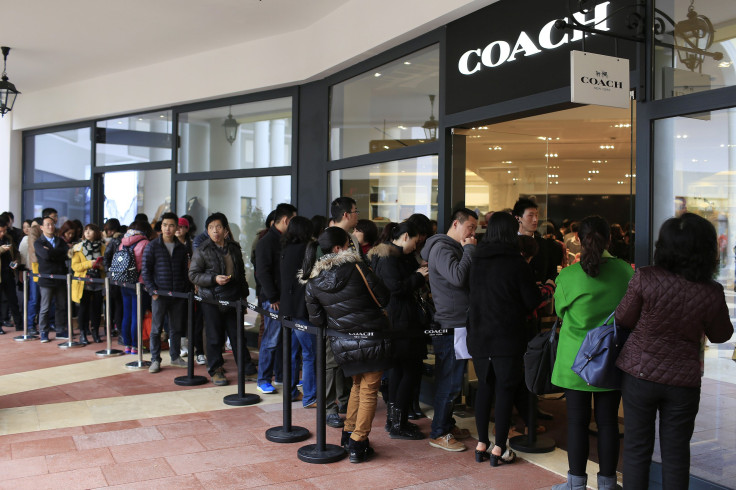Cheaper Diapers, Face Cream And Fur Coats, As China Cuts Import Duties To Encourage Domestic Spending

SHANGHAI -- Chinese shoppers were anticipating lower prices on imported diapers, cosmetics, suits and sports shoes, among other products, on Monday, as new tariff cuts came into effect. The cuts are aimed at boosting domestic consumption -- and, indirectly, at encouraging Chinese citizens not to make so many of their purchases abroad, as China's economic growth slows.
Duties on 14 different categories of products are being cut by half on average, with duties on imported diapers reduced from 7.5 percent to just 2 percent, and those on skin care products from 5 percent to 2 percent. There was good news for wealthy shoppers too, with tariffs on imported fur coats cut by more than half, to 10 percent.
And though the latter category may not mean much to ordinary consumers, diapers and cosmetics have been two of the main purchases made by Chinese shoppers in Hong Kong, where tariffs and taxes are far lower. Indeed, the number of Chinese tourists buying up such goods to take back home has grown so high in recent years that it provoked protests by Hong Kong residents earlier this year.
The phenomenon of Chinese citizens buying overseas to take advantage of cheaper prices -- and sometimes, perceived better quality -- has become a matter of growing concern for the government in Beijing. Last year, 100 million Chinese tourists spent $160 billion abroad, according to official figures -- with 70 percent of luxury purchases made overseas, according to one recent report. Stories of Chinese citizens coming back from Japan with electric toilet seats they had purchased during this year’s Chinese New Year holiday also caused some embarrassment and soul-searching in the Chinese media.
And with the country’s export-focused economy experiencing a slowdown -- China’s GDP grew by 7 percent in the first quarter of this year, the slowest rate for six years -- the tariff cuts are “necessary to boost domestic consumption,” China’s Vice Finance Minister Shi Yaobin said at a news conference on Friday. Shi rejected warnings that the cuts would have a major effect on tax revenue, saying they were expected to boost imports and therefore domestic growth, according to the Global Times newspaper.
Figures from China’s Ministry of Commerce showed that consumption made up for just over half of China’s GDP growth last year, but growth in domestic consumption slowed in the first four months of this year. The official sense of urgency regarding the need to boost domestic spending was highlighted by the fact that the tariff cuts came into effect just over a month after they were first announced by Premier Li Keqiang -- who has said he wants the government to react faster to economic challenges.
And with the government also seeing tariff cuts as a way of reducing sometimes politically sensitive trade deficits, the authorities have pledged to allow more duty-free shops in China’s newly established Free Trade Zones, in Shanghai and other cities -- and to reduce tariffs on cross-border e-commerce. In the past half year, major e-commerce companies, including Amazon, Tmall (owned by Alibaba) and JD (China’s second biggest e-commerce site), have all set up new platforms for imported products, with Amazon now providing direct shipping from abroad in an attempt to cut out mark-ups by local delivery companies. Experts say e-commerce imports are expected to grow by more than 25 percent annually over the next few years.
Analysts say these developments also reflect a growing and fast-evolving taste for foreign goods among Chinese consumers: imported wines can now be found in many local convenience stores in major Chinese cities, while olive oil -- unheard of in China 15 years ago -- is now popular in some coastal cities.
State media acknowledged that the immediate impact of the tariff cuts would be relatively small in terms of price reductions to consumers. However, Shanghai’s Dragon TV news said the cuts were a signal to retailers that the prices of imported goods “should be more regulated” in future. It added that big international brands were now reconsidering the relatively high mark-ups they have often made on goods sold in China -- it said if such brands wanted to develop the Chinese market they would need to adjust their prices, rather than expecting Chinese customers to "foot the bill."
In what the report described as an example of the “butterfly effect,” cosmetics manufacturers Estee Lauder and L’Oreal have both said they will reduce the price of their products in China since the tariff cuts were announced. And Dragon TV reported that some luxury brands -- popular purchases for Chinese consumers abroad due to large mark-ups in domestic stores -- were following suit: it said that Chanel had recently reduced the price differential on some of its products sold in China, compared to those sold in Europe, by 90 percent, from around 10,000 yuan (about $1,600) to just 1,000 yuan. It said Cartier and Gucci were also introducing price cuts in China -- as long queues outside one of the latter’s Shanghai stores this weekend testified.
© Copyright IBTimes 2024. All rights reserved.






















